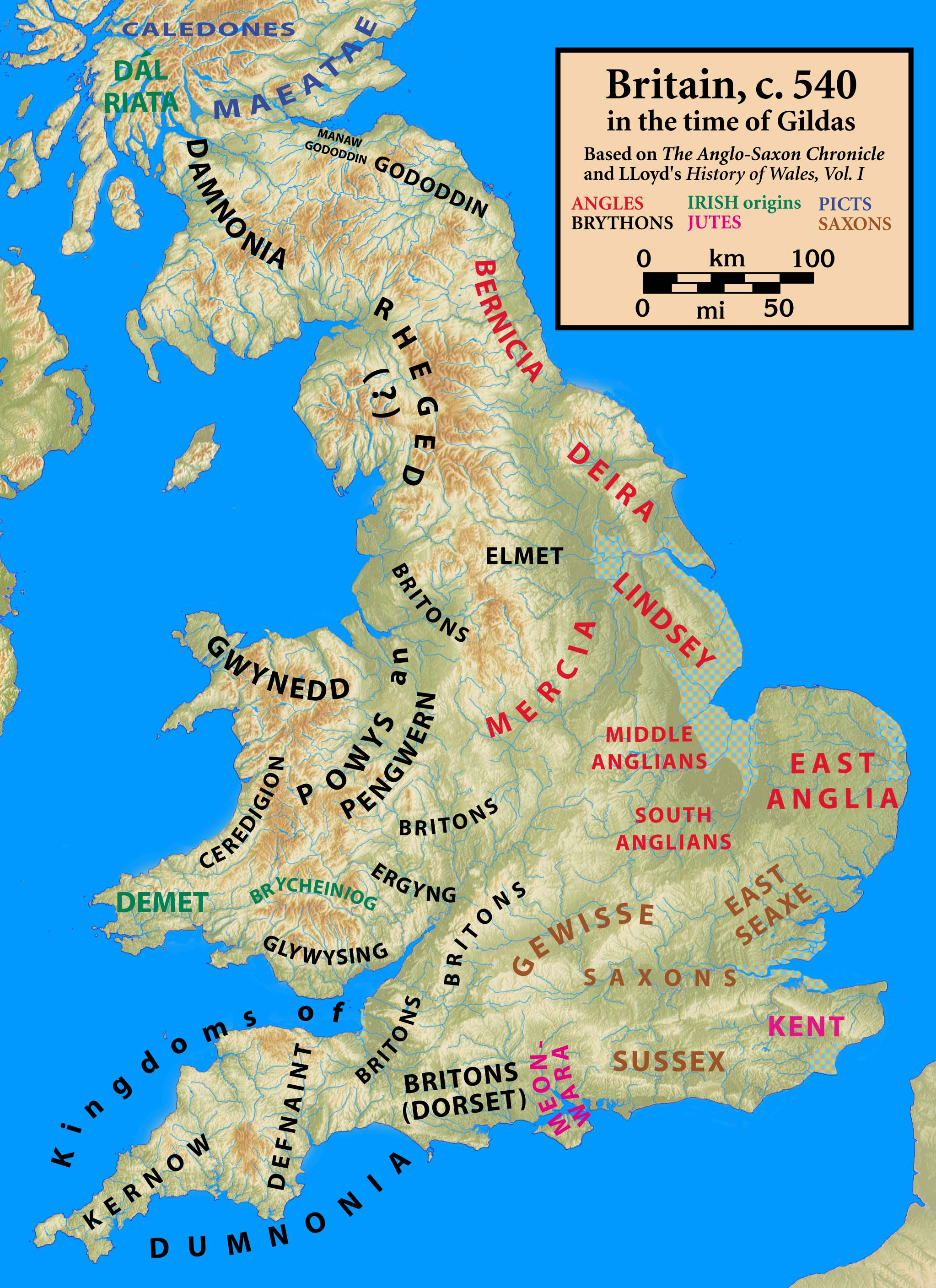
History of Anglo-Saxon England
Anglo-Saxon England or Early Medieval England, existing from the 5th to the 11th centuries from soon after the end of Roman Britain until the Norman Conquest in 1066, consisted of various Anglo-Saxon kingdoms until 927, when it was united as the Kingdom of England by King Æthelstan (r. 927–939). It became part of the short-lived North Sea Empire of Cnut, a personal union between England, Denmark and Norway in the 11th century.
This article is about historical events in Anglo-Saxon England. For the early phases of that history, see Anglo-Saxon settlement of Britain. For Anglo-Saxon culture and society, see Anglo-Saxons. For the academic journal, see Anglo-Saxon England (journal).
Engla land (Old English)
The Anglo-Saxons migrated to Britain from mainland northwestern Europe after the Roman Empire withdrawal from the isle at the beginning of the 5th century. Anglo-Saxon history thus begins during the period of sub-Roman Britain following the end of Roman control, and traces the establishment of Anglo-Saxon kingdoms in the 5th and 6th centuries (conventionally identified as seven main kingdoms: Northumbria, Mercia, East Anglia, Essex, Kent, Sussex, and Wessex); their Christianisation during the 7th century; the threat of Viking invasions and Danish settlers; the gradual unification of England under the Wessex hegemony during the 9th and 10th centuries; and ending with the Norman Conquest of England by William the Conqueror in 1066.
The Normans persecuted the Anglo-Saxons and overthrew their ruling class to substitute their own leaders to oversee and rule England.[1] However, Anglo-Saxon identity survived beyond the Norman Conquest,[2] came to be known as Englishry under Norman rule, and through social and cultural integration with Romano-British Celts, Danes and Normans became the modern English people.
Terminology[edit]
Bede completed his book Historia ecclesiastica gentis Anglorum (Ecclesiastical History of the English People) in around 731. Thus, the term for English people (Latin: gens Anglorum; Old English: Angelcynn) was in use by then to distinguish Germanic groups in Britain from those on the continent (Old Saxony in Northern Germany).[2][a] The term 'Anglo-Saxon' came into use in the 8th century (probably by Paul the Deacon) to distinguish English Saxons from continental Saxons (Ealdseaxan, 'old' Saxons).
The historian James Campbell suggested that it was not until the late Anglo-Saxon period that England could be described as a nation-state.[3] It is certain that the concept of "Englishness" only developed very slowly.[4][5]
By 600, a new order was developing, of kingdoms and sub-Kingdoms. The medieval historian Henry of Huntingdon conceived the idea of the Heptarchy, which consisted of the seven principal Anglo-Saxon kingdoms (Heptarchy literal translation from the Greek: hept – seven; archy – rule).[55]
By convention, the Heptarchy period lasted from the end of Roman rule in Britain in the 5th century, until most of the Anglo-Saxon kingdoms came under the overlordship of Egbert of Wessex in 829. This approximately 400-year period of European history is often referred to as the Early Middle Ages or, more controversially, as the Dark Ages.
Although heptarchy suggests the existence of seven kingdoms, the term is just used as a label of convenience and does not imply the existence of a clear-cut or stable group of seven kingdoms. The number of kingdoms and sub-kingdoms fluctuated rapidly during this period as competing kings contended for supremacy.[56]
The four main kingdoms in Anglo-Saxon England were East Anglia, Mercia, Northumbria (originally two kingdoms, Bernicia and Deira), and Wessex. Minor kingdoms included Essex, Kent, and Sussex. Other minor kingdoms and territories are mentioned in sources such as the Tribal Hideage:
At the end of the 6th century the most powerful ruler in England was Æthelberht of Kent, whose lands extended north to the River Humber.[57] In the early years of the 7th century, Kent and East Anglia were the leading English kingdoms.[58] After the death of Æthelberht in 616, Rædwald of East Anglia became the most powerful leader south of the Humber.[58]
Following the death of Æthelfrith of Northumbria, Rædwald provided military assistance to the Deiran Edwin in his struggle to take over the two dynasties of Deira and Bernicia in the unified kingdom of Northumbria.[58] Upon the death of Rædwald, Edwin was able to pursue a grand plan to expand Northumbrian power.[58]
The growing strength of Edwin of Northumbria forced the Anglo-Saxon Mercians under Penda into an alliance with the Welsh King Cadwallon ap Cadfan of Gwynedd, and together they invaded Edwin's lands and defeated and killed him at the Battle of Hatfield Chase in 633.[59][60] Their success was short-lived, as Oswald (one of the sons of the late King of Northumbria, Æthelfrith) defeated and killed Cadwallon at Heavenfield near Hexham.[61] In less than a decade Penda again waged war against Northumbria, and killed Oswald in the Battle of Maserfield in 642.[62]
Oswald's brother Oswiu was chased to the northern extremes of his kingdom.[62][63] However, Oswiu killed Penda shortly after, and Mercia spent the rest of the 7th and all of the 8th century fighting the kingdom of Powys.[62] The war reached its climax during the reign of Offa of Mercia,[62] who is remembered for the construction of a 150-mile-long dyke which formed the Wales/England border.[64] It is not clear whether this was a boundary line or a defensive position.[64] The ascendency of the Mercians came to an end in 825, when they were soundly beaten under Beornwulf at the Battle of Ellendun by Egbert of Wessex.[65]